The UNA Resources, Local Updates and Newsletter Blog
Stop trying to find information all over the web. Start below with a simple access to read the blog’s United Nurse of Alberta (UNA) resources, UNA Local 115 updates and our newsletter so you can be informed!
Catagories:
Local | Newsletters | UNA
Archive
- April 2025
- March 2025
- January 2025
- December 2024
- November 2024
- October 2024
- July 2024
- May 2024
- April 2024
- March 2024
- February 2024
- January 2024
- December 2023
- November 2023
- October 2023
- September 2023
- August 2023
- June 2023
- May 2023
- April 2023
- March 2023
- February 2023
- November 2022
- August 2022
- June 2022
- May 2022
- April 2022
- March 2022
- January 2022
- November 2021
- October 2021
- September 2021
- June 2021
- May 2021
- March 2021
- February 2021
- January 2021
- August 2020
- June 2020
- May 2020
- April 2020
- March 2020
- December 2019
- October 2019
- September 2019
- July 2019
- April 2019
- February 2019
- January 2019
- December 2018
- November 2018
- October 2018
- August 2018
- November 2017
- June 2017
- April 2017
- January 2017
- September 2016
- April 2016
- December 2015
- October 2015
- May 2015
- March 2015
- January 2015
- November 2014
- September 2014
- June 2014
- April 2014
- September 2013
- June 2013
- April 2013
- February 2013
- October 2012
- April 2012
- February 2012
- November 2011
- October 2011
- September 2011
- March 2011
- February 2011
- December 2010
- August 2010
- April 2010
- February 2010
- December 2009
- October 2009
- August 2009
- June 2009
- May 2009
- August 2008
- January 2008
- December 2007
- July 2007
- May 2007
- April 2007
- March 2007
- February 2007
- January 2007
- December 2006
- November 2006
- October 2006
- September 2006
- August 2006
- July 2006
- June 2006
- May 2006
- April 2006
- March 2006
- February 2006
- January 2006
- December 2005
- November 2005
- October 2005
- September 2005
- August 2005
- July 2005
- June 2005
- May 2005
- April 2005
- March 2005
- February 2005
- January 2005
- December 2004
- November 2004
- October 2004
- September 2004
- June 2004
- May 2004
- April 2004
- February 2004
- January 2004
- December 2003

Duty during meal breaks requires notice and proper pay
Duty during meal breaks requires notice and proper pay
Situations often develop in UNA workplaces in which nurses are required to be available to work during their scheduled meal breaks, which means they are unable to leave the building during their meal breaks. Meal breaks are normally not counted when the Employee’s hours of work are calculated. Under UNA’s Provincial Collective Agreement, an Employer is permitted to make such a demand – with two important conditions. The Employee must be advised in advance of the requirement to be available, and the Employees must be paid for meal periods when they have received such a notification and are therefore unable to leave the building. They must receive this pay even if they are not called to work. The relevant Article in the Collective Agreement is 7.01 (c), which states: Although meal periods are excluded in the calculation of regular hours of work, Employees required to be readily available for duty during their meal period shall be so advised in advance and paid for those meal periods at their Basic Rate of Pay. For more information, contact your UNA local executive or your UNA Labour Relations Officer at 1-800-252-9394.

Overtime for compulsory in-services on designated days of rest
Overtime for compulsory in-services on designated days of rest
Employees who are required to attend a compulsory in-service session on any day they are not regularly scheduled to work must be paid at the overtime rate of 2X their regular salary. Under Article 35.02 (a) of the UNA Provincial Collective Agreement, Employees can be required to attend compulsory in-services on days they are not normally working. Because the sessions are compulsory, it is the equivalent of mandatory overtime, and must be paid at the overtime rate. UNA has won two arbitrations on this topic. Employees who are offered choices of attending a compulsory in-service on a day they are normally working cannot choose instead to attend on a non-working day, in order to get the overtime rate. In the case of any dispute about the correct rate to be paid for attending a compulsory inservice, check immediately with your UNA local executive or Labour Relations Officer.
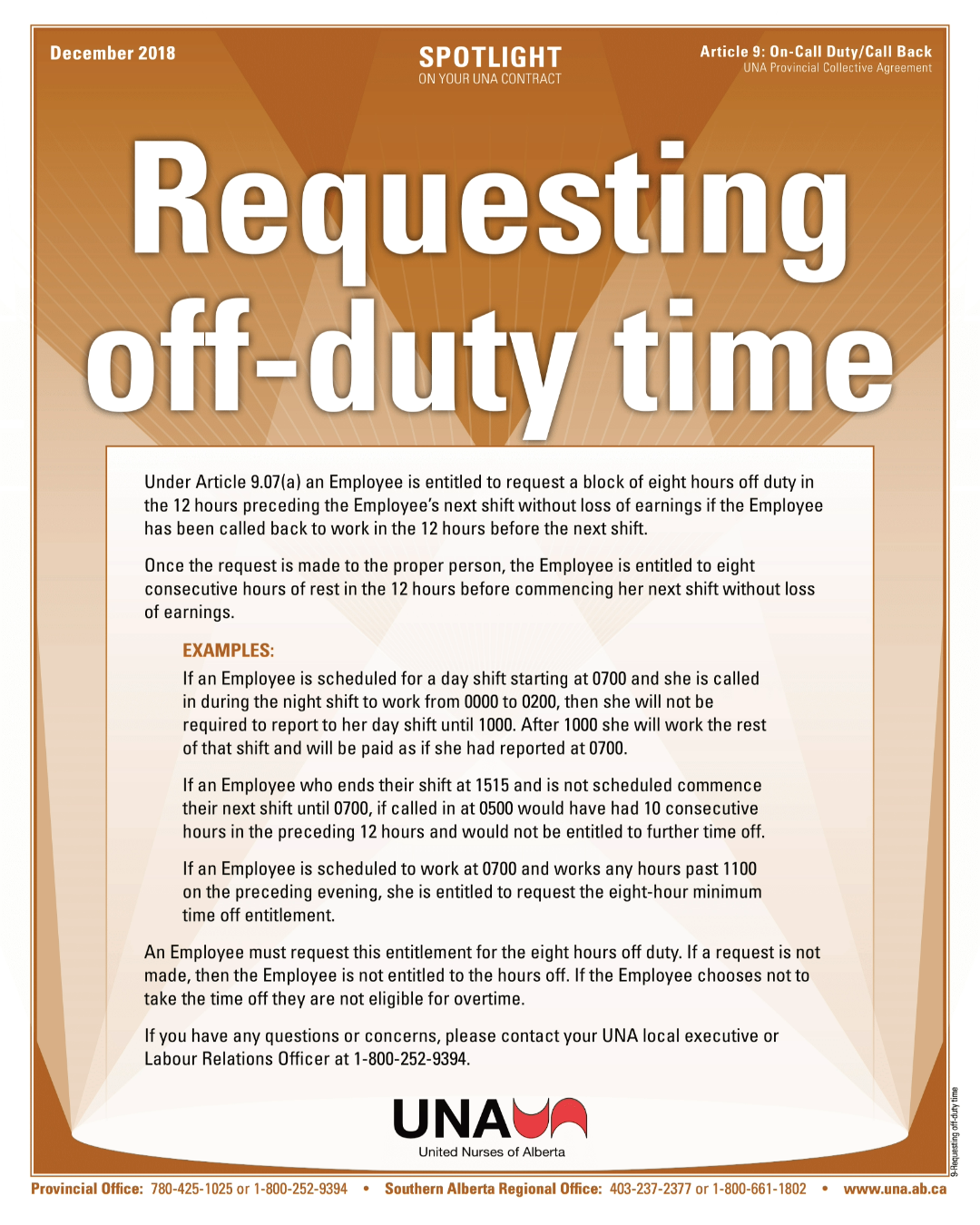
Requesting off-duty time
Requesting off-duty time
Under Article 9.07(a) an Employee is entitled to request a block of eight hours off duty in the 12 hours preceding the Employee’s next shift without loss of earnings if the Employee has been called back to work in the 12 hours before the next shift. Once the request is made to the proper person, the Employee is entitled to eight consecutive hours of rest in the 12 hours before commencing her next shift without loss of earnings. EXAMPLES: If an Employee is scheduled for a day shift starting at 0700 and she is called in during the night shift to work from 0000 to 0200, then she will not be required to report to her day shift until 1000. After 1000 she will work the rest of that shift and will be paid as if she had reported at 0700. If an Employee who ends their shift at 1515 and is not scheduled commence their next shift until 0700, if called in at 0500 would have had 10 consecutive hours in the preceding 12 hours and would not be entitled to further time off. If an Employee is scheduled to work at 0700 and works any hours past 1100 on the preceding evening, she is entitled to request the eight-hour minimum time off entitlement. An Employee must request this entitlement for the eight hours off duty. If a request is not made, then the Employee is not entitled to the hours off. If the Employee chooses not to take the time off they are not eligible for overtime. If you have any questions or concerns, please contact your UNA local executive or Labour Relations Officer at 1-800-252-9394.
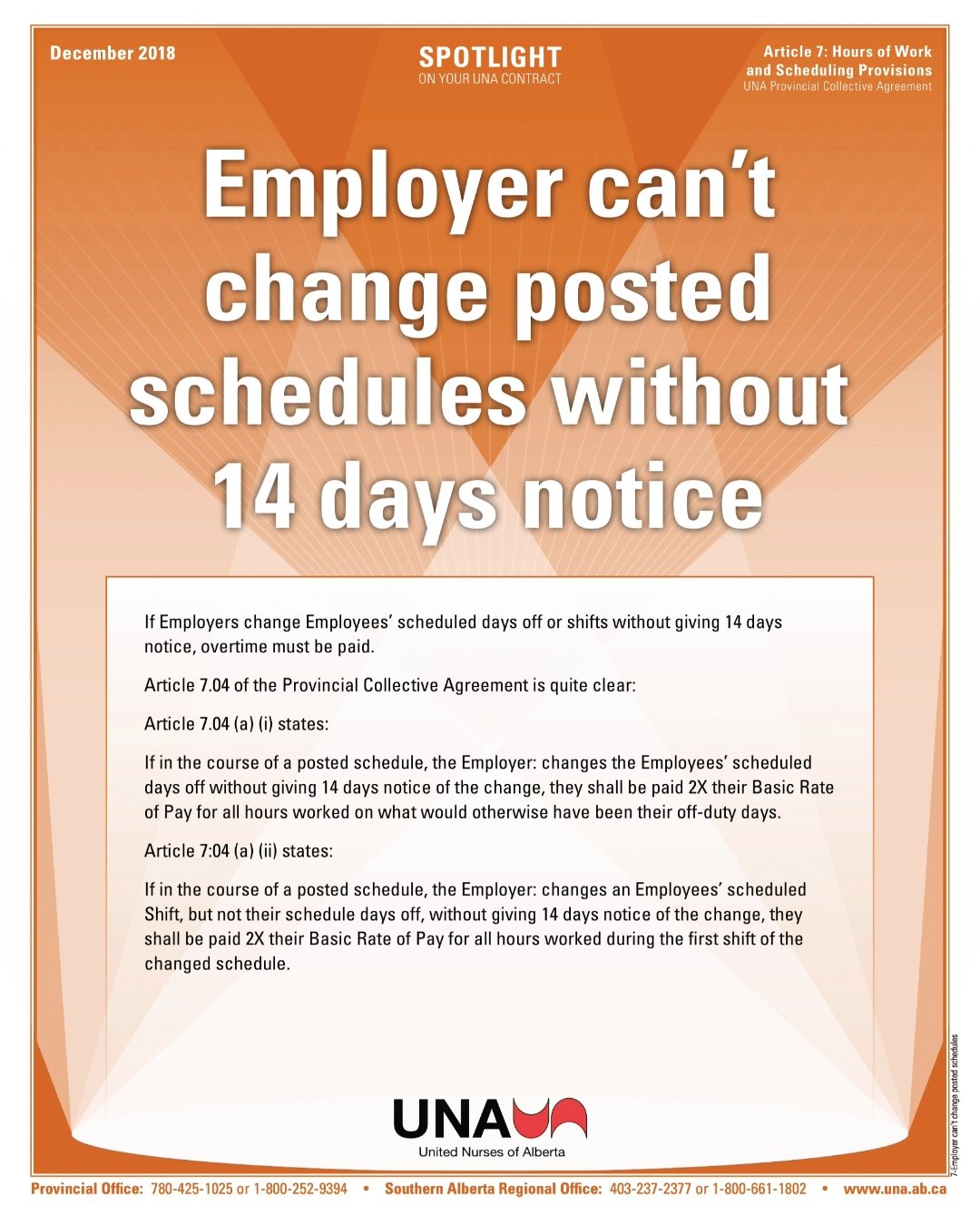
Employer can't change posted schedules without 14 days notice
Employer can't change posted schedules without 14 days' notice
If Employers change Employees’ scheduled days off or shifts without giving 14 days notice, overtime must be paid. Article 7.04 of the Provincial Collective Agreement is quite clear: Article 7.04 (a) (i) states: If in the course of a posted schedule, the Employer: changes the Employees’ scheduled days off without giving 14 days notice of the change, they shall be paid 2X their Basic Rate of Pay for all hours worked on what would otherwise have been their off-duty days. Article 7:04 (a) (ii) states: If in the course of a posted schedule, the Employer: changes an Employees’ scheduled Shift, but not their schedule days off, without giving 14 days notice of the change, they shall be paid 2X their Basic Rate of Pay for all hours worked during the first shift of the changed schedule.
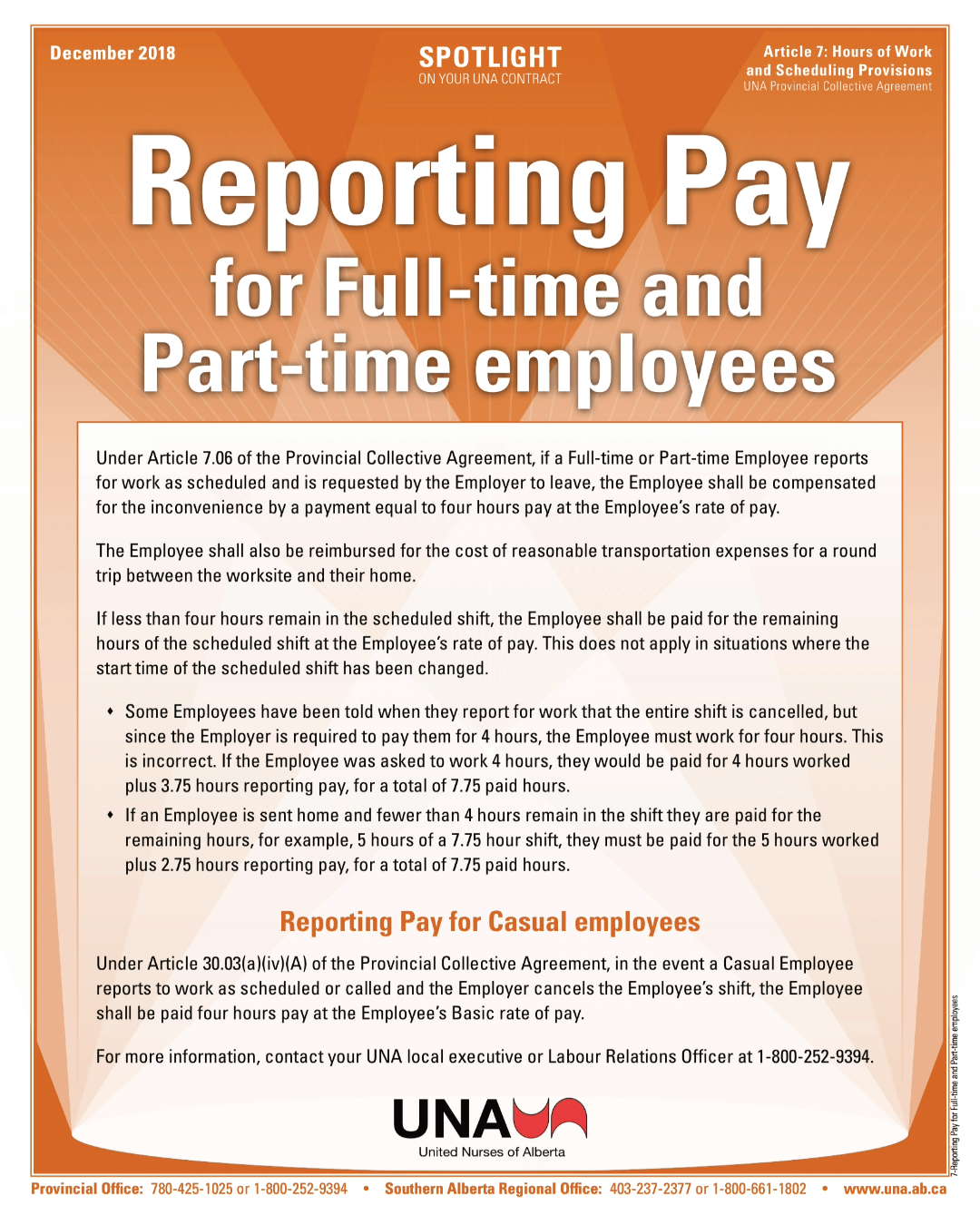
Reporting Pay for Full-time and Part-time employees
Reporting Pay for Full-time and Part-time employees
Under Article 7.06 of the Provincial Collective Agreement, if a Full-time or Part-time Employee reports for work as scheduled and is requested by the Employer to leave, the Employee shall be compensated for the inconvenience by a payment equal to four hours pay at the Employee’s rate of pay. The Employee shall also be reimbursed for the cost of reasonable transportation expenses for a round trip between the worksite and their home. If less than four hours remain in the scheduled shift, the Employee shall be paid for the remaining hours of the scheduled shift at the Employee’s rate of pay. This does not apply in situations where the start time of the scheduled shift has been changed. Some Employees have been told when they report for work that the entire shift is cancelled, but since the Employer is required to pay them for 4 hours, the Employee must work for four hours. This is incorrect. If the Employee was asked to work 4 hours, they would be paid for 4 hours worked plus 3.75 hours reporting pay, for a total of 7.75 paid hours. If an Employee is sent home and fewer than 4 hours remain in the shift they are paid for the remaining hours, for example, 5 hours of a 7.75 hour shift, they must be paid for the 5 hours worked plus 2.75 hours reporting pay, for a total of 7.75 paid hours. Reporting Pay for Casual employees Under Article 30.03(a)(iv)(A) of the Provincial Collective Agreement, in the event a Casual Employee reports to work as scheduled or called and the Employer cancels the Employee’s shift, the Employee shall be paid four hours pay at the Employee’s Basic rate of pay. For more information, contact your UNA local executive or Labour Relations Officer at 1-800-252-9394.

Employees assigned on-call duty must be paid for telephone consultations
Employees assigned on-call duty must be paid for telephone consultations
Employees who are assigned on-call duties must be paid for telephone consultations during the times they are on call. Article 9.01,On-Call, of the UNA Provincial Collective Agreement defines on-call duty as “any period during which an Employee is not on regular duty and during which the Employee is on-call and must be reasonably available to respond without undue delay to any request to report for duty.” Article 9.08, Telephone Consultation, says that “when an Employee, who has been assigned on-call duty, is consulted by telephone and is authorized to handle patient/resident/client matters without returning to the workplace, such Employee shall be paid the overtime rate for the total accumulated time spent on telephone consultation(s), and corresponding required documentation, during the on-call period.” In addition, Article 9.08 states that “if telephone consultation has been provided by the Employee and the total accumulated time spent on such telephone consultation(s) and corresponding required documentation, during the on-call period, is less than 30 minutes, the Employee shall be compensated at the overtime rate for 30 minutes.” For more information, or to address a problem being paid for telephone consultations during on-call periods, call your UNA local executive or Labour Relations Officer at 1-800-252-9394.
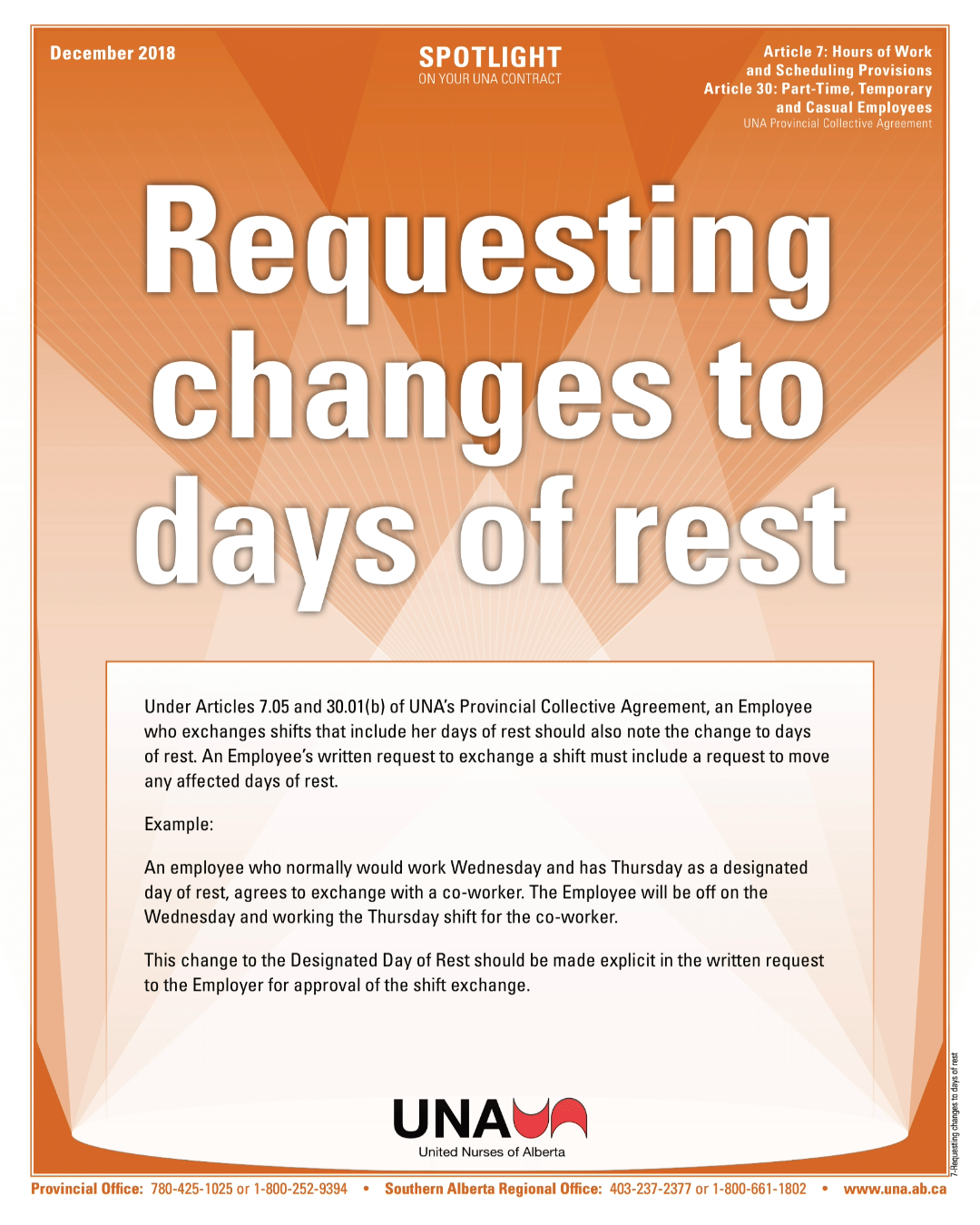
Requesting changes to days of rest
Requesting changes to days of rest
Under Articles 7.05 and 30.01(b) of UNA’s Provincial Collective Agreement, an Employee who exchanges shifts that include her days of rest should also note the change to days of rest. An Employee’s written request to exchange a shift must include a request to move any affected days of rest. Example: An employee who normally would work Wednesday and has Thursday as a designated day of rest, agrees to exchange with a co-worker. The Employee will be off on the Wednesday and working the Thursday shift for the co-worker. This change to the Designated Day of Rest should be made explicit in the written request to the Employer for approval of the shift exchange.
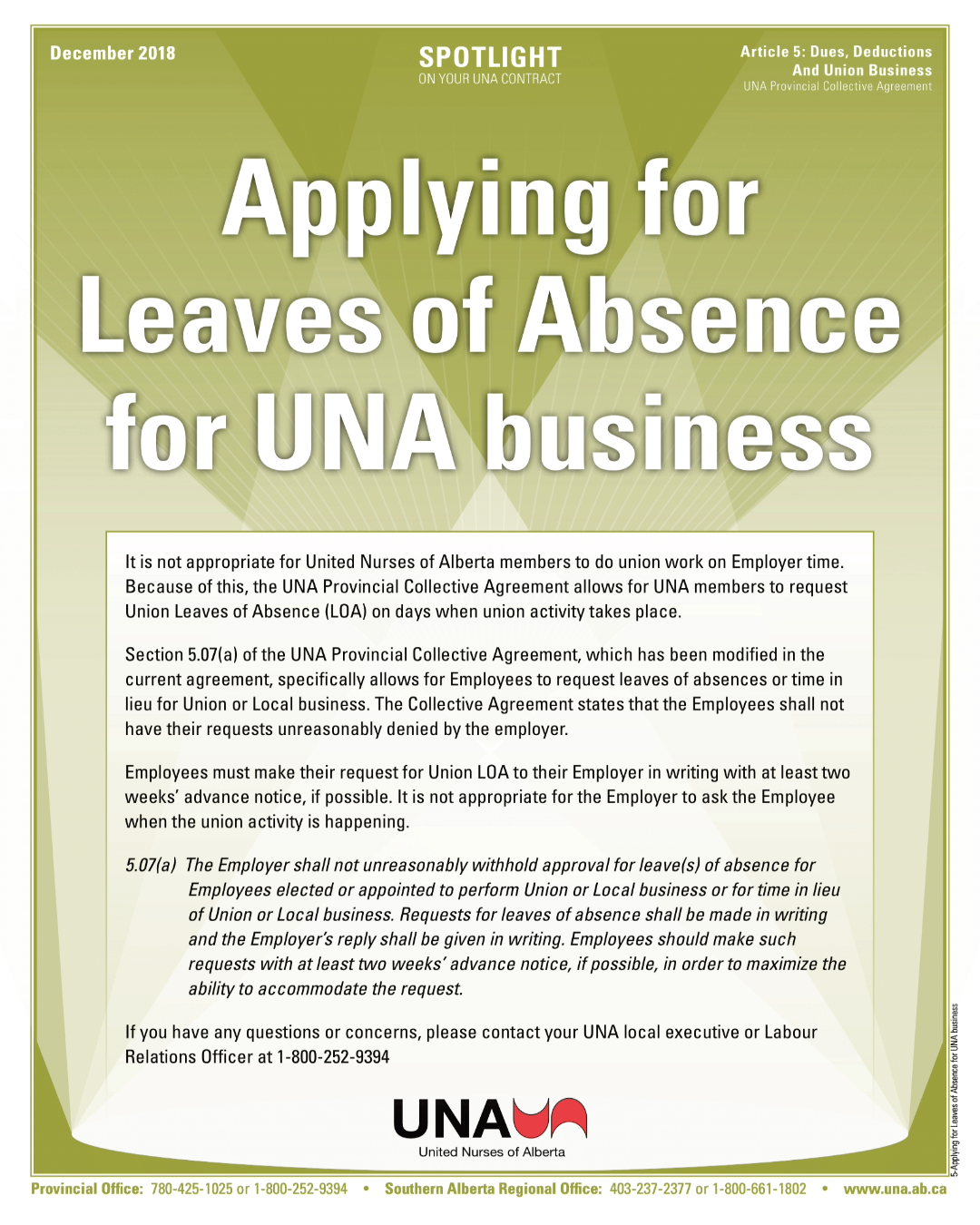
Time for New Member Orientation
Applying for Leaves of Absence for UNA business
The Provincial Collective Agreement ensures that time is made available for UNA Locals to hold new member orientation presentations. Article 5.05 (a) describes the right of locals to make a bi-weekly presentation of up to 45 minutes to new Employees with respect to the structure of the Local as well as their rights, responsibilities and benefits under the Collective Agreement. The contract also states that attendance at the presentation shall not be compulsory, that an Employer representative may be present at such presentation and that Employees will suffer no loss of regular earnings as a result of attending the presentation. The Local needs to provide at least 14 working days advance notice to the Employer of the date, time and place for each presentation. This article was first introduced into the collective agreement in 2013. It is now the responsibility of UNA Locals to set the date, time and place for each presentation. If your local has not done so, please contact your Employer to make necessary arrangements. If you have any questions or concerns, please contact your UNA local executive or Labour Relations Officer at 1-800-252-9394.
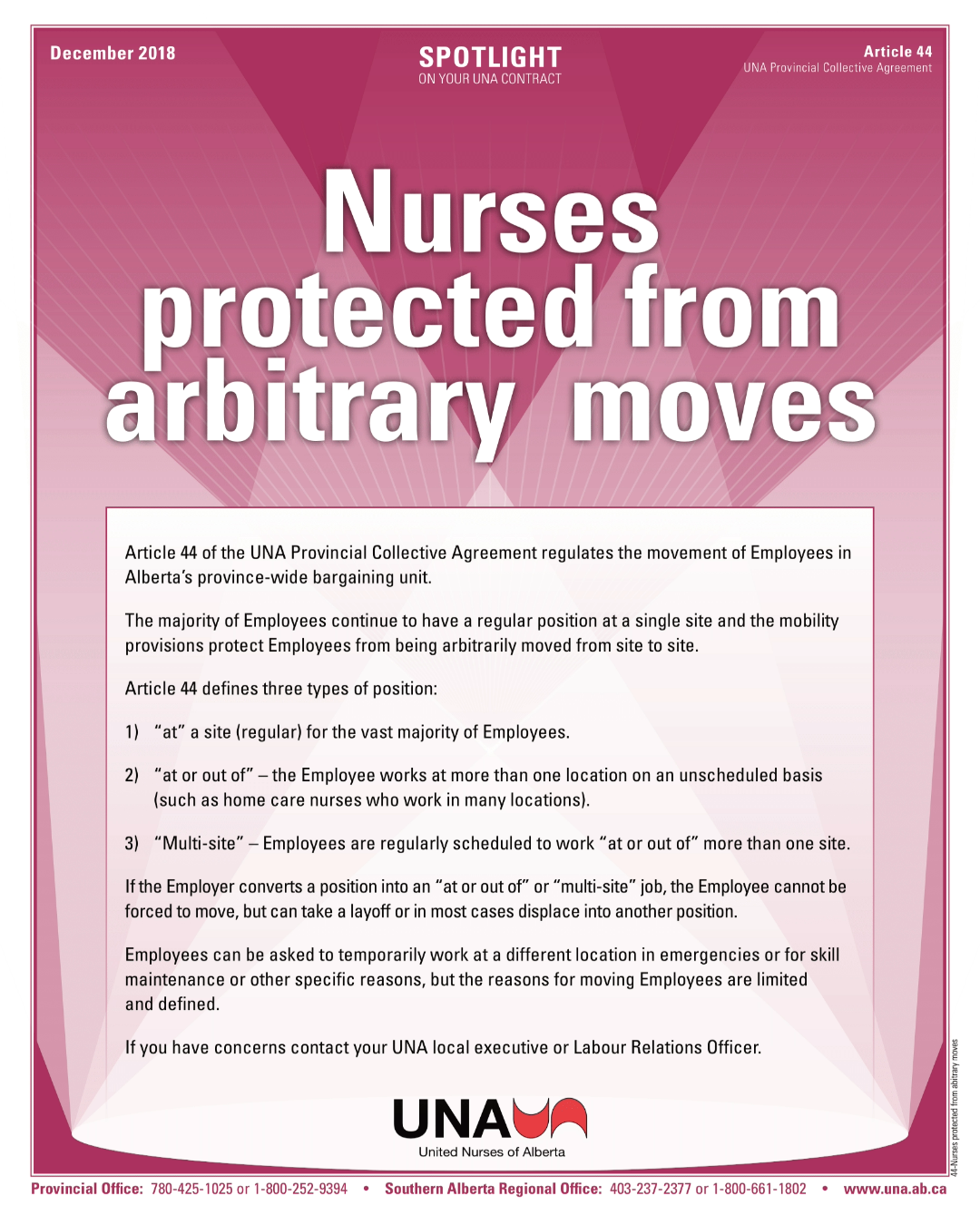
Nurses protected from arbitrary moves
Nurses protected from arbitrary moves
Article 44 of the UNA Provincial Collective Agreement regulates the movement of Employees in Alberta’s province-wide bargaining unit. The majority of Employees continue to have a regular position at a single site and the mobility provisions protect Employees from being arbitrarily moved from site to site. Article 44 defines three types of position: 1) “at” a site (regular) for the vast majority of Employees. 2) “at or out of” – the Employee works at more than one location on an unscheduled basis (such as home care nurses who work in many locations). 3) “Multi-site” – Employees are regularly scheduled to work “at or out of” more than one site. If the Employer converts a position into an “at or out of” or “multi-site” job, the Employee cannot be forced to move, but can take a layoff or in most cases displace into another position. Employees can be asked to temporarily work at a different location in emergencies or for skill maintenance or other specific reasons, but the reasons for moving Employees are limited and defined. If you have concerns contact your UNA local executive or Labour Relations Officer.

Eligibility for Long Service Pay
Eligibility for Long Service Pay
According to Letter of Understanding #7, included with the United Nurses of Alberta Provincial Collective Agreement, Employees with twenty or more calendar years of nursing service shall receive a two per cent Long Service Pay Adjustment. In order to receive this additional pay, an Employee must provide the Employer with reasonable proof that they have been registered with a nursing licensing body for at least twenty years. Employees should provide this information within ninety days of being hired or achieving twenty calendar years. It is not sufficient that a resume includes your employment history. The Employee must provide specific proof of registration with a nursing licensing body. For more information see the 2007 Joint Statement - Retention. If you have any questions or concerns, please contact your UNA local executive or Labour Relations Officer at 1-800-252-9394.
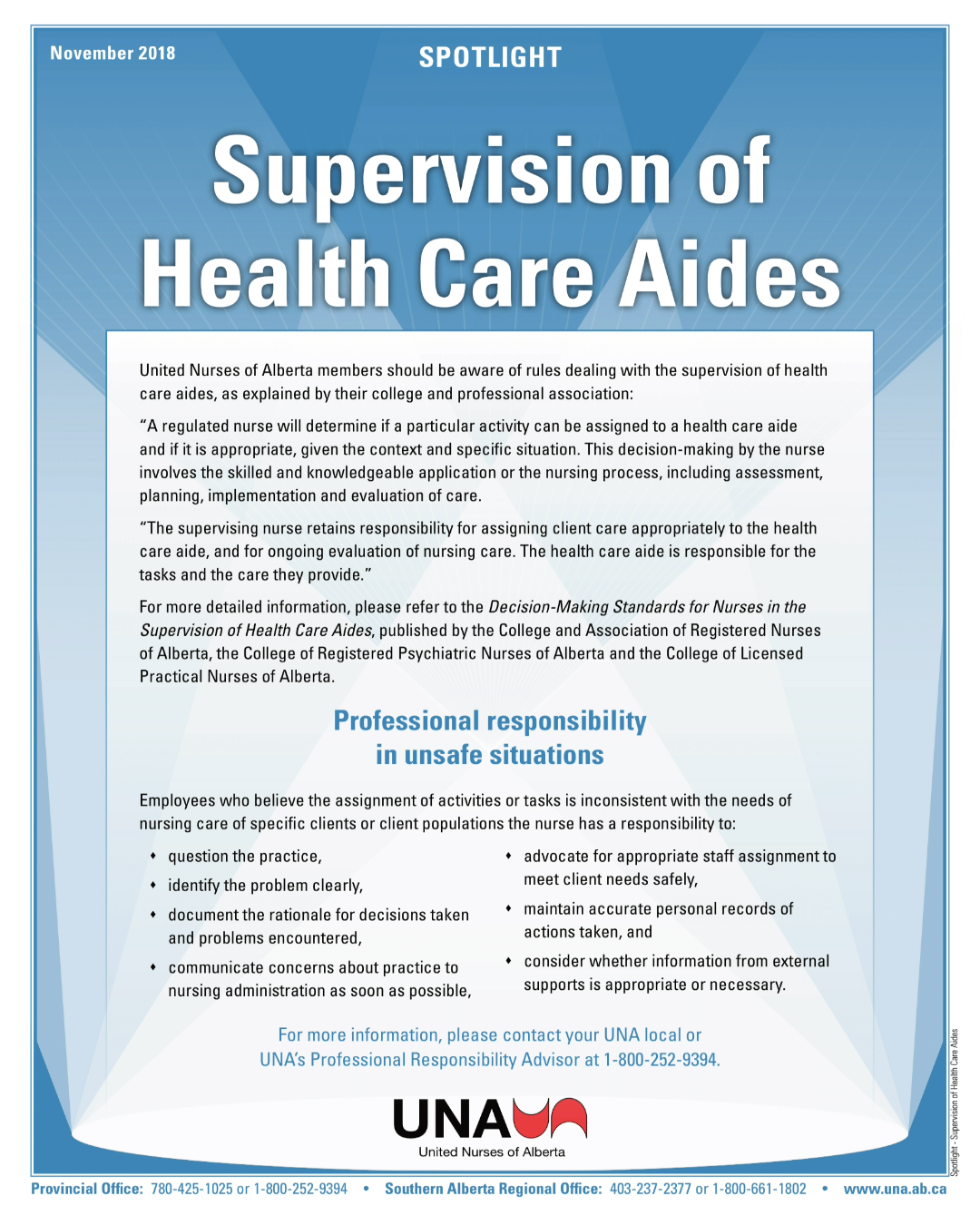
Supervision of Health Care Aides
Supervision of Health Care Aides
United Nurses of Alberta members should be aware of rules dealing with the supervision of health care aides, as explained by their college and professional association: “A regulated nurse will determine if a particular activity can be assigned to a health care aide and if it is appropriate, given the context and specific situation. This decision-making by the nurse involves the skilled and knowledgeable application or the nursing process, including assessment, planning, implementation and evaluation of care. “The supervising nurse retains responsibility for assigning client care appropriately to the health care aide, and for ongoing evaluation of nursing care. The health care aide is responsible for the tasks and the care they provide.” For more detailed information, please refer to the Decision-Making Standards for Nurses in the Supervision of Health Care Aides, published by the College and Association of Registered Nurses of Alberta, the College of Registered Psychiatric Nurses of Alberta and the College of Licensed Practical Nurses of Alberta. Professional responsibility in unsafe situations Employees who believe the assignment of activities or tasks is inconsistent with the needs of nursing care of specific clients or client populations the nurse has a responsibility to: question the practice, identify the problem clearly, document the rationale for decisions taken and problems encountered, communicate concerns about practice to nursing administration as soon as possible, advocate for appropriate staff assignment to meet client needs safely, maintain accurate personal records of actions taken, and consider whether information from external supports is appropriate or necessary. For more information, please contact your UNA local or UNA’s Professional Responsibility Advisor at 1-800-252-9394.

Part-time and casual employees can receive credit for hours worked at another employer
Payment for Additional Shifts
Alberta Health Services and United Nurses of Alberta recently resolved a grievance regarding payment for voluntary additional unscheduled shifts where a portion of the shift falls on a Parttime Employee’s Designated Day of Rest. This settlement is binding on all of AHS. Part-time Employees who voluntarily work an additional unscheduled shift straddling two calendar days where a portion of the shift worked falls on an Employee’s Designated Day of Rest shall be paid for the entire shift at the rate of pay determined by where the majority of hours worked fall. Example: If a majority of hours worked fall on a “blank” day (ie: a day that is neither a scheduled work day nor a Designated Day of Rest) will be considered to have received their Designated Day of Rest for scheduling purposes. They will be paid at the basic rate of pay for the entire shift. If a majority of hours worked fall on a Designated Day of Rest, Part-time Employees will be considered to have received their Designated Day of Rest for scheduling purposes. In this circumstance, the Employee will be paid at 2X the basic rate for the entire shift. This settlement does not alter a Part-time Employee’s ability to mutually agree with the Employer to exchange their Designated Day of Rest to other non-scheduled “blank” days, pursuant to Article 30.01(b)(i) of the UNA Provincial Collective Agreement.

UNA members urged to claim their 2-per-cent RRSP or TFSA supplement
UNA members urged to claim their 2-per-cent RRSP or TFSA supplement
Members of the United Nurses of Alberta need to be aware their Employer has agreed to contribute to a supplemental pension plan in the form of a Registered Retirement Savings Plan or Tax Free Savings Account contribution. UNA strongly recommends that all members who are regular employees act to take advantage of this provision if they haven’t done so. It is a benefit they cannot receive without taking specific action to enroll. So without acting, employees are going without a 2 per cent retirement income supplement to their salary that they are entitled to receive under the collective agreement. Article 29.05 of the UNA Provincial Collective Agreement (a) The Employer shall provide a supplemental pension plan in the form of a Registered Retirement Savings Plan (RRSP) or Tax-Free Savings Account (TFSA). Employees shall determine the allocation to either a RRSP or TFSA. Employees may change their allocation effective April 1st of each year. (b) Effective on the Employee’s date of enrollment, a Regular Employee shall have the right to contribute up to 2% of his or her regular earnings into the RRSPor TFSA until December 31st of the year the Employee turns 71. The Employer shall match the Employee’s contributions into the RRSP or the TFSA. (c) A Regular Employee who, by virtue of his or her age, no longer qualifies under Article 29.05(b), shall receive an additional 2% of her or his regular earnings. (d) “Earnings” as defined in Article 29.05(b) above, will include WCB earnings until such time that the Employee exhausts his or her sick leave credits and is deemed to be on sick leave without pay. The agreement does require that employees contribute 2 per cent of their salary for the employer to match, and employees need to enroll in the program for the employer to contribute this money. No UNA member should go without funds for their retirement that their Employer has agreed to contribute. This supplemental pension is not available to temporary or casual employees. If you have any questions or concerns, please contact your UNA local executive or Labour Relations Officer at 1-800-252-9394.

Five Days of Education Leave for work on a degree
Five Days of Education Leave for work on a degree
Written advance notice required Employees must be granted up to five days of leave without loss of pay for work on a postsecondary education course as part of a degree relevant to nursing practice. To utilize the five days of leave, Employees should inform the Employer in writing with as much advance notice as possible. Failing to do so could result in not being granted the five days of leave. Article 22.06 of UNA’s Provincial Collective Agreement states: (b) An Employee registered at a university or college pursuing a degree relevant to nursing on the Employee’s own time who consequently is required to fulfill requirements established by the university or college, may be granted up to five days leave without loss of regular earnings per year to fulfill such attendance requirements. Prior to commencement of such studies, the Employee shall advise the Employer in writing of such program requirements.

Benefits part-time and temporary employees
Benefits part-time and temporary employees
Benefits are restricted only for Employees who work less than 15 hours a week, or who are in a temporary position of less than six months. All Employees who work more than this are eligible for all benefits. Employees whose benefits are restricted are still eligible for: the Supplementary Health Benefits including vision care and 80 per cent of all prescriptions Dental Plan, They are not eligible for other pre-paid health benefits, life insurance, accidental death and disability insurance and short-term and long-term disability insurance. Article 21.06 of UNA’s Provincial Collective Agreement states: 21.06 Such coverage shall be provided to regular and Temporary Employees, except for: (a) Part-time Employees, whose regularly scheduled hours of work are fewer than 15 hours per week averaged over one (1) complete Cycle of the Shift Schedule; and (b) Temporary Employees, who are hired to work for a position of less than six (6) months;

Employers must pay costs for Physician’s note
Employers must pay costs for Physician’s note
If an Employer requires an Employee to provide proof of illness, such as a physician’s note, the Employer must reimburse the Employee for any costs for that information. Some physicians charge administrative fees for providing a note for sick leave. If an Employer asks an Employee for a physician’s note, the Employer must pay the fee. Employees should be cautious about providing the Employer with access to personal medical information. The Employer could attempt to use the information to limit sick leave. An Employee is not obligated to sign any medical information release form for the Employer.

Employers cannot just pay out named holidays
Employers cannot just pay out named holidays
An Employee working on a Named Holiday is entitled to an alternate day off at “a mutually agreed time.” The “day in lieu” can be added to the Employee’s vacation, or the Employee can ask to take it at any time, with the Employer’s agreement. The day can also be “paid out” but ONLY if the Employee agrees. A full-time Employee changing to part-time retains her alternate days off until there is an agreed time off or until she agrees to take payment in lieu of a day off.

Employees can carry over Stat banks
Employees can carry over Stat banks
Employees who have accumulated Named Holiday days-in-lieu in a “stat bank” are normally able to choose when they take those days off. The Employer CANNOT unilaterally pay out a stat bank. According to Article 18.03 (a) and (c) of UNA’s Provincial Collective Agreement, if the Employer and Employee cannot agree on the days to be taken off, the Employer can schedule the day off adjacent to a scheduled day of rest.
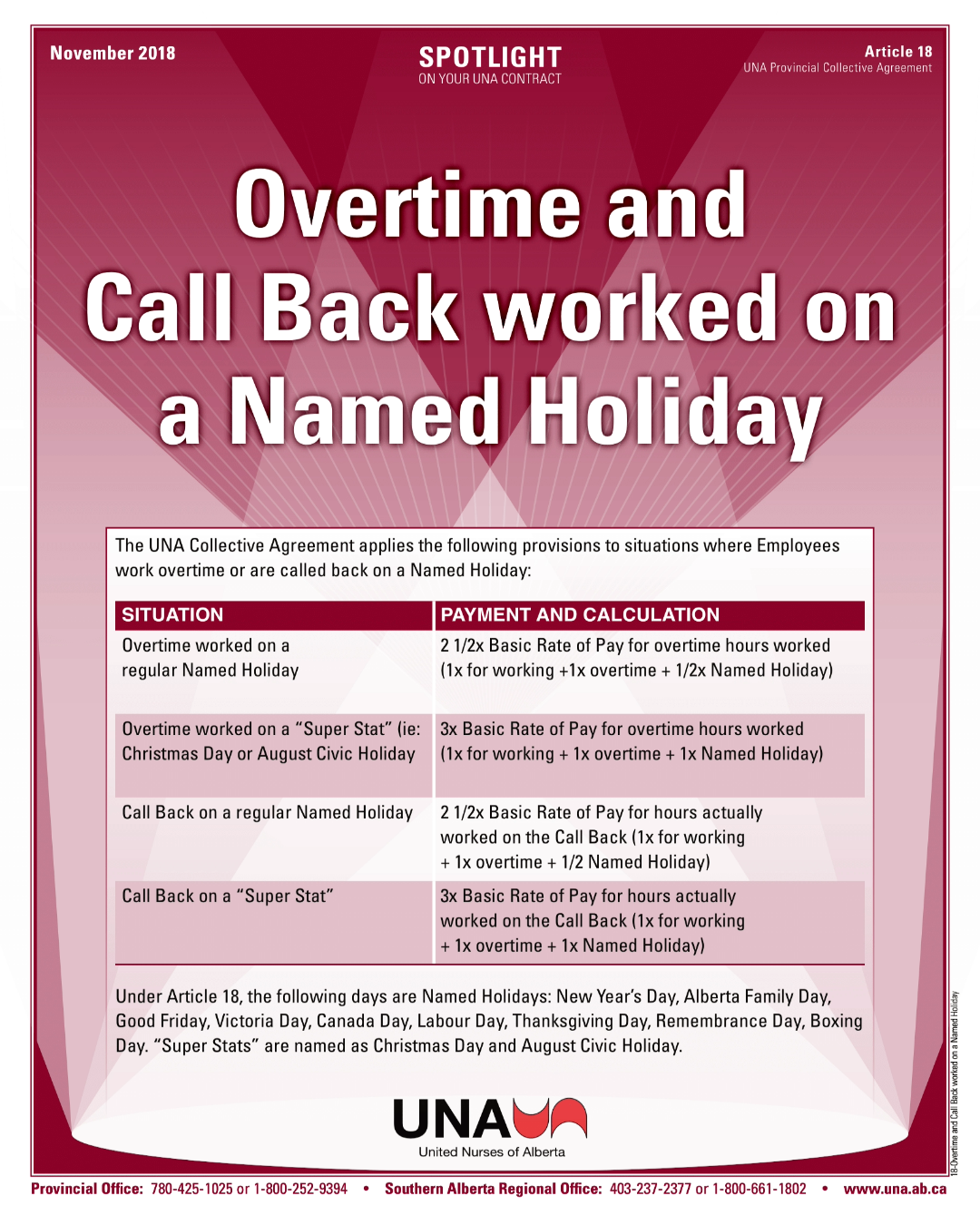
Overtime and Call Back worked on a Named Holiday
Overtime and Call Back worked on a Named Holiday
The UNA Collective Agreement applies the following provisions to situations where Employees work overtime or are called back on a Named Holiday: SITUATION PAYMENT AND CALCULATION Overtime worked on a regular Named Holiday 2 1/2x Basic Rate of Pay for overtime hours worked (1x for working +1x overtime + 1/2x Named Holiday) Overtime worked on a “Super Stat” (ie: Christmas Day or August Civic Holiday 3x Basic Rate of Pay for overtime hours worked (1x for working + 1x overtime + 1x Named Holiday) Call Back on a regular Named Holiday 2 1/2x Basic Rate of Pay for hours actually worked on the Call Back (1x for working + 1x overtime + 1/2 Named Holiday) Call Back on a “Super Stat” 3x Basic Rate of Pay for hours actually worked on the Call Back (1x for working + 1x overtime + 1x Named Holiday) Under Article 18, the following days are Named Holidays: New Year’s Day, Alberta Family Day, Good Friday, Victoria Day, Canada Day, Labour Day, Thanksgiving Day, Remembrance Day, Boxing Day. “Super Stats” are named as Christmas Day and August Civic Holiday
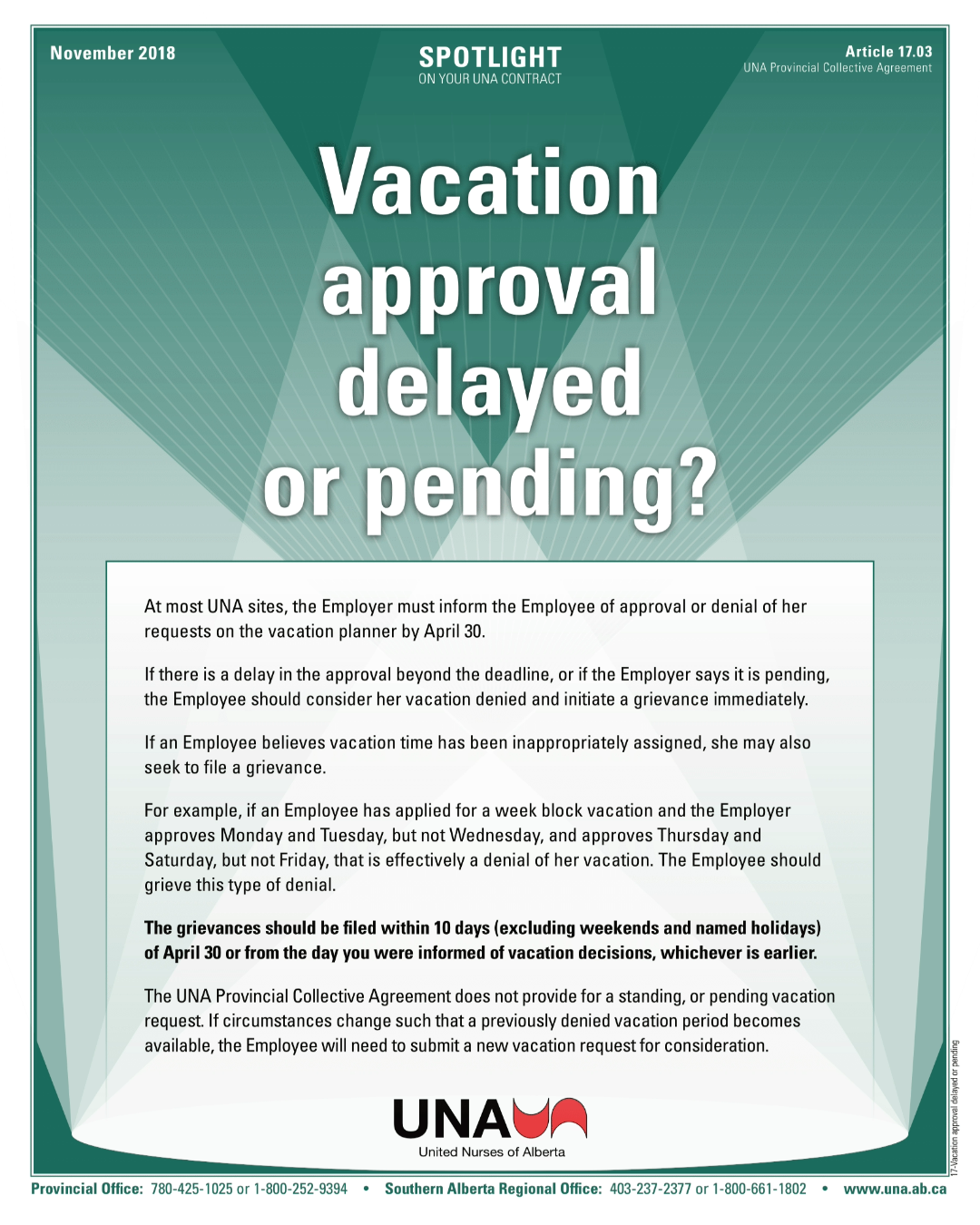
Vacation approval delayed or pending
Vacation approval delayed or pending
At most UNA sites, the Employer must inform the Employee of approval or denial of her requests on the vacation planner by April 30. If there is a delay in the approval beyond the deadline, or if the Employer says it is pending, the Employee should consider her vacation denied and initiate a grievance immediately. If an Employee believes vacation time has been inappropriately assigned, she may also seek to file a grievance. For example, if an Employee has applied for a week block vacation and the Employer approves Monday and Tuesday, but not Wednesday, and approves Thursday and Saturday, but not Friday, that is effectively a denial of her vacation. The Employee should grieve this type of denial. The grievances should be filed within 10 days (excluding weekends and named holidays) of April 30 or from the day you were informed of vacation decisions, whichever is earlier. The UNA Provincial Collective Agreement does not provide for a standing, or pending vacation request. If circumstances change such that a previously denied vacation period becomes available, the Employee will need to submit a new vacation request for consideration.
